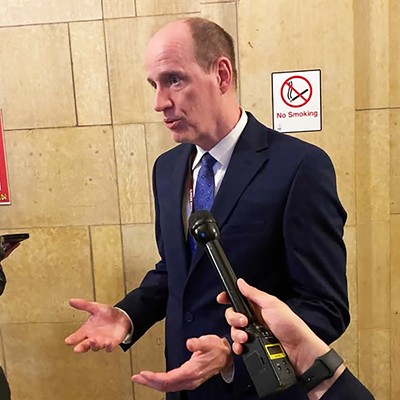The Illinois Racing Board hasn’t kept proper track of either money or drugs at horse racing courses, according to a report by the state auditor general.
The report released last month came after lawmakers approved a landmark expansion of gambling that could boost the racing board’s workload by increasing the number of races at tracks that want casino-style gambling.
Criticism included failure to properly account for euthanasia drugs, according to the June 4 report. Auditors found that veterinarians at one unnamed track didn’t accurately log such drugs. An invoice for one purchase didn’t indicate how many vials were kept at tracks. At another track, auditors reported, veterinarians didn’t properly maintain a log showing usage of the drugs and balance remaining in inventory.
The board didn’t dispute issues involving euthanasia drugs and said in a written response that it has initiated corrective action. Auditors examined board operations for a two-year period ending in the summer of 2018. In a prior report covering two years ending in the summer of 2016, auditors reported problems with drug testing procedures, including a finding that the board didn’t ensure that drug-testing records kept by the University of Illinois, which held a contract to test for drugs in racehorses, had been adequately secured to prevent unauthorized alterations. Drug testing records were kept on a shared computer drive, auditors found. In one case, auditors reported, a new university employee had accidentally changed a file. Problems uncovered in last year’s report, the auditor general reported, have been resolved.
Issues with drug testing and euthanasia drugs correspond with a fall in the number of positive drug tests at the state’s three racetracks. Between 2009 and 2016, the number of positive drug tests each year ranged from 25 to 55. In 2017, the racing board reported six positives, and the number for last year, also, was six, including results for both thoroughbreds and standardbreds that pull carts. Domenic DiCera, racing board executive director, blamed the decrease in positive tests on decreases in the number of races. “It’s more to do with less racing than anything else, at this point,” he said.
However, the percentage of positive tests has fallen at a faster rate than the number of races and number of horses tested. In 2016, for example, 10,521 thoroughbreds started races at Illinois tracks, and 3,653 were tested for drugs, according to racing board records, with 26 testing positive. In 2018, 9,569 thoroughbreds started races and 3,651 were tested for drugs, with five testing positive. With the number of horses tested nearly identical, it amounts to a fivefold decrease in positive tests over the course of three years.
While auditors found problems with recordkeeping, DiCera said, no substantive issues were discovered with euthanasia drugs. “They didn’t like the way the veterinarians maintained the logs,” he said. “I can state that there was a lack of materiality in terms of what the finding produced.”
In the most recent report, the auditor general also found that the board hasn’t ensured that tracks have held the required number of races for Illinois horses. By law, thoroughbred tracks are supposed to host at least two races a day and six races a week limited to Illinois-bred horses. In nearly 10 percent of race dates examined, two of the state’s three tracks didn’t have Illinois-only horse races. Auditors also reported that all three tracks didn’t have the required weekly number of Illinois-only horse races, with six out of 28 weeks of racing calendars failing to meet the standard. The racing board blamed a lack of Illinois-bred horses for the shortfall as well as a steward’s failure to ensure the standard was met.
Other issues in the June report included lax oversight of admissions taxes tracks are supposed to collect. The board, auditors reported, relied on reports from tracks to determine how much the state was owed without proper verification by a board auditor. DiCera says the board has addressed the issue. “We accepted the recommendation of the auditor and we implemented many of those recommendations,” he said.
The auditor general also found that the board hasn’t been verifying that off-track-betting parlors have been making required payments to local governments, but the board pointed out that no county or municipality has complained. There does not appear to be a problem in Sangamon County, where county officials and the Springfield Office of Budget and Management each report receiving one percent of the amount wagered at Capitol Teletrack, as required by law.
Auditors also say that the racing board hasn’t ensured that overdue child support payments are deducted from winning bets. Auditors found the same issue in last year’s report. The issue centers on advance deposit wagering, which allows gamblers to stock accounts with money, then make bets. DiCera says the board is working on the issue, but has had difficulty getting necessary information from state databases that track delinquent child support payments. “It’s their opinion there have been insufficient efforts,” DiCera said. “That’s not necessarily true.”
Contact Bruce Rushton at [email protected].
Racing board falls short
[
{
"name": "Air - MedRect Combo - Inline Content 1",
"component": "11490391",
"insertPoint": "3",
"requiredCountToDisplay": "1",
"parentWrapperClass": "fdn-ads-inline-content-block"
},{
"name": "Air - MedRect Combo - Inline Content 2",
"component": "11490392",
"insertPoint": "7",
"requiredCountToDisplay": "5",
"parentWrapperClass": "fdn-ads-inline-content-block"
},{
"name": "Air - MedRect Combo - Inline Content 3",
"component": "11490393",
"insertPoint": "12",
"requiredCountToDisplay": "9",
"parentWrapperClass": "fdn-ads-inline-content-block"
}
]
Illinois Times has provided readers with independent journalism for almost 50 years, from news and politics to arts and culture.
Your support will help cover the costs of editorial content published each week. Without local news organizations, we would be less informed about the issues that affect our community..
Got something to say?
Send a letter to the editor and we'll publish your feedback in print!




















